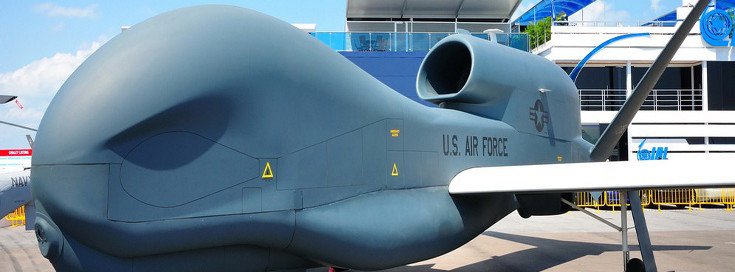Unmanned Systems (UAVs)

The Georgia Applied Research Activity of the Georgia Institute of Technology, Georgia Tech Research Institute was awarded a contract for 'development of a test and evaluation roadmap for unmanned and autonomous systems. This roadmap addressed all five major unmanned and autonomous systems domains, including air, ground and underwater, as well as sea surface and space-based systems.' This contract, and other related efforts, places Georgia at the forefront of the evolving autonomous technologies and their practical applications—both military and non-defense related.
Georgia has the workforce, knowledge base, research capacity/capability and facilities to provide a great location for any business in the unmanned systems arena.
Explore Georgia's Unmanned Systems' Assets
- COMPANIES
-
- Adaptive Flight
- Aerospace Missions
- Aerotonomy
- Cyphy Works
- Guided Systems
- iRobot
- QinetiQ
- SpaceWorks Engineering
AUVSI-
Georgia has two active Association for Unmanned Vehicle Systems International (AUVSI) Chapters. One chapter is in Atlanta and is focused primarily on air systems. The other is in the Columbus/Ft. Benning area and is focused primarily on ground robotics.
GROUND-BASED ROBOTICS-
The Maneuver Center of Excellence is an Army leader in the development of Unmanned Ground Systems (UGS), a.k.a. robots. As TRADOC's lead for Ground Robotics, the MCoE created the Joint Ground Robotic Integration Team (JGRIT) to bring together combat developers, researchers and the acquisition community from across the Department of Defense. Comprised of more than 50 organizations, the JGRIT integrates plans, initiatives and developments required to field Ground Robotic capabilities.
Integral to the MCoE's UGS efforts is the Maneuver Battle Lab's (MBL) live, virtual, and constructive experiments to inform emerging UGS requirements. The MBL sponsors two major robotic events annually-the Army Expeditionary Warrior Experiment and the Robotics Rodeo-to allow robotic developers to demonstrate new capabilities to users in operational scenarios. In addition to being TRADOC's lead for Ground Robotics, it is the combat developer for the UGS used by the maneuver forces. These systems enhance the operational capability of our Soldiers by providing protection, persistence and endurance. MCoE's contribution in Unmanned Ground Systems will influence their development from the Soldier to the entire military.
UNMANNED SYSTEM TESTING CAPABILITY-
National Security Associates is located on 700 acres in Chattahoochee County bordering Ft. Benning. NSA's success in the test and evaluation arena has been established by our anticipating and understanding the customer's needs, and then using our flexible testing facility to exceed the customer's expectations. Complementing the UV range is a shoot house, urban village, various weapons ranges, breaching areas and varied topography and road conditions which can be easily integrated into the customer's test. NSA can accommodate virtually any UGV testing/training requirement. If you would like to obtain additional information, please contact Ron Gibson, (706) 989-1922 or www.teamnsa.com.
In June 2011, AIM Academy opened in Blakely, Georgia. Located about an hour South of Ft. Benning, AIM is a 2300-acre military/paramilitary training and testing facility. They are in the process of developing an unmanned vehicle facility that can be used by units for training and by industry for testing. It will cater primarily to UGVs, but coordination is underway with the FAA to also allow the use of UAVs.
In addition to NSA, Georgia stakeholders (government, private industry, academia) are working together to establish another aerial vehicle testing facility. The facilities above, along with Middle Georgia College, will make it easier for Georgia companies to have easier access to both flight test airspace and ground testing facilities.
EDUCATION-
- Georgia Tech
BS, MS PhD
ProgramsAerospace Engineering, Computer Science, Electrical Engineering, Computer Engineering, Materials Science Engineering, Industrial Engineering, Mechanical Engineering, Environmental Engineering, Operations Research, Bioengineering, Biomedical Engineering, Robotics - University of Georgia
BS, MS, PhD Programs
Computer Science, Artificial Intelligence, Environmental Engineering, Environmental Health, Math, Physics - Mercer
BS and MS
ProgramsBiomedical Engineering, Computer Engineering, Electrical Engineering, Environmental Engineering, Mechanical Engineering, Software Engineering - Columbus State
BS and MS
Programs, Computer Science (artificial intelligence) - Middle Georgia College (Aviation Campus)
Certificate, AS, AAS and BAS
ProgramsAircraft Structural Technology, Advanced Composites, Aviation Maintenance Technology, Avionics Technology, Air Traffic Control Management, Airport Management, Flight Management (fixed wing/rotary wing), Logistics Management, Engineering, Applied Research Institute
- Georgia Tech
GEORGIA UAV/UAS WORKING GROUP-
The Georgia Center of Innovation for Aerospace (COI-A) started the Unmanned Aerial Systems (UAS) Working Group to assure that the programs of the COI-A and other state organizations are aligned with the needs of the UAS industry. The working group is composed of key Georgia UAS leaders from industry, government, and academia to provide an ongoing dialogue and coordination of UAS activities across the state. The working group meets quarterly to provide feedback on new developments, needs and concerns within the UAS community, and make recommendations for new COI-A initiatives. If you would like to join or learn more about the Georgia UAS Working Group, please contact Chad Dennis, COI-A UAS Program Coordinator at [email protected] or call (478) 374-6712.
